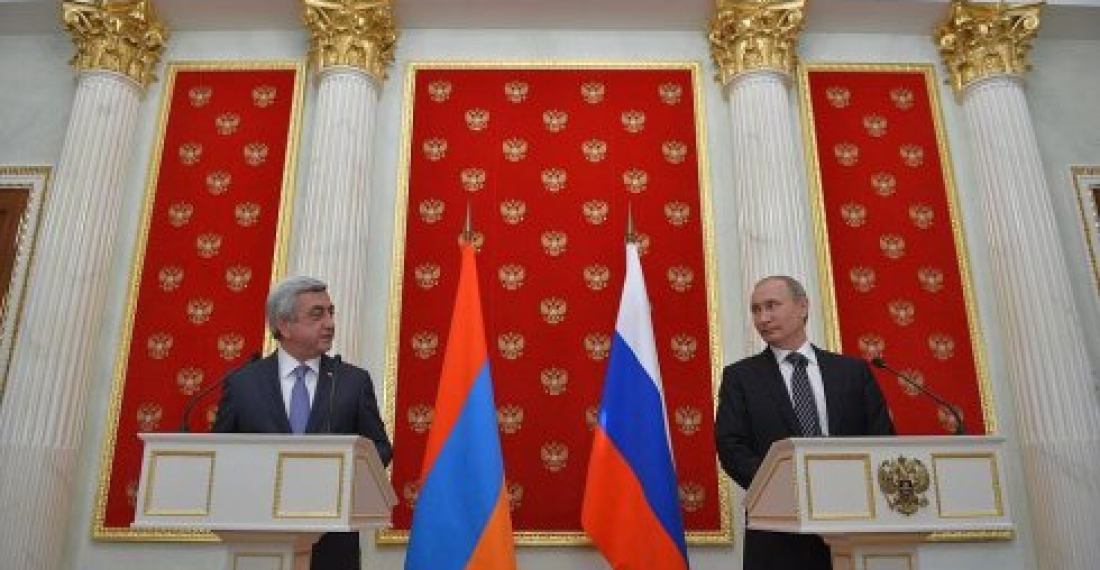Президент России Владимир Путин сформулировал свое видение о мире после урегулирования нагорно-карабахского конфликта между Арменией и Азербайджаном. Об этом Путин рассказал во время пресс-конференции в Москве, в среду (10 августа), по итогам переговоров с президентом Армении Сержем Саргсяном.
Владимир Путин заявил, что "Россия заинтересована в снижении напряжённости в отношениях между нашими соседями. Продолжим оказывать всяческое содействие поиску развязок «карабахского узла» в рамках Минской группы ОБСЕ, а также в ходе прямых контактов с Ереваном и Баку. Надеемся, что Армения и Азербайджан смогут выйти на компромиссное - без победителей и побеждённых - урегулирование имеющихся противоречий".
Отвечая на вопрос армянского журналиста президент России добавил:
"На самом деле мне думается, что и Армения, и Азербайджан реально хотят найти выход из этой проблемы, с тем чтобы жить в мире, согласии, с тем чтобы сотрудничать и развивать экономику. Не в последнюю очередь в этом заинтересована и Армения, снять все ограничения инфраструктурные, экономические, для того, чтобы развивалась экономика и чтобы люди в конечном итоге жили лучше, чтобы укреплялась армянская государственность. В этом состоит наша цель, стремление к урегулированию. И цель заключается в том, чтобы достичь этих результатов.
К этому же стремится и азербайджанская сторона. Мои последние контакты с Президентом Алиевым в Баку об этом говорят. Но нужно найти такие подходы и такие схемы, при которых, как я уже говорил, никто бы не чувствовал себя ни победителем, ни побеждённым, а чтобы это было такое решение, которое было бы выработано лидерами Армении и Азербайджана, было бы принято обществом обеих стран. Вот это самое главное. А Россия, как и некоторые другие страны Минской группы, могла бы выступить в качестве гаранта, приняв соответствующие, если нужно, и резолюции Совета Безопасности Организации Объединённых Наций."
Президент Путин отклонил критику касательно того, что Россия подпитывает конфликт путем продажи большого количества оружия в Азербайджан. По этому поводу он сказал:
"Что касается вооружения, то у нас существует программа работы с Арменией по этому направлению. Армения - член ОДКБ, Армения -наш союзник. У нас есть определённые взаимные обязательства, и Россия всегда своих обязательств придерживается, всегда свои обязательства исполняет.
На современном рынке вооружений любая страна может купить практически любое оружие. И, скажем, такая страна, как Азербайджан, нефтедобывающая страна, страна с почти 10-миллионным населением и с быстрорастущей экономикой, с достаточно большим объёмом золотовалютных резервов, конечно, в состоянии купить вооружение где угодно. Понимаете? Где угодно. Но я бы не стал обращать сейчас внимание на военную сторону дела. Если мы хотим решить проблему, то решать её нужно мирными средствами."
источник: commonspace.eu по материалам kremlin.ru
фото: Президент Путин и президент Саргсян на пресс-конференции после встречи в Москве, в среду, 10 августа 2016 (фото любезно предоставлено пресс-службой президента России)






